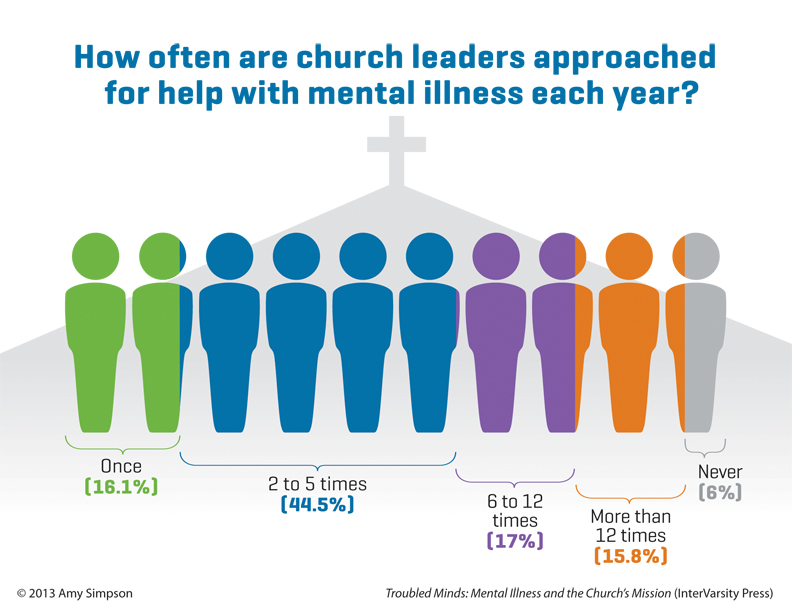Christians care about human suffering.
The biblical narrative recounts that Jesus restored sight to the blind, enabled the lame to walk, and drove demons out of the possessed. His disciples carried on that work, and for thousands of years Christians have attended to healing and wholeness for body, mind, and spirit.
But, not all shapes of distress have prompted the same level of response. In the face of mental illness, for example, it seems social stigma and other forces have disrupted Protestant efforts to provide care. Why? Has this always been the case? What can we learn from past successes and failures that might deepen the faithfulness of our responses and thereby alleviate such suffering in the present?
Beginning in the colonial era, the historical record shows that American Protestants professed to care for the well being of bodies, minds, and spirits, but those living with mental illness often received minimal attention. This remains true in many congregations, despite the prevalence of mental illness.
Exceptions have always existed, however. Writing in 1724, the Puritan minister Cotton Mather asked, “If we seek so diligently for medication for the sick body, why not with greater care work hard to find what cures and relieves the mind?” [1] More than 200 years later, the Presbyterian physician, Karl Menninger would have agreed wholeheartedly. Mental illness, both believers proclaimed, demands concrete Christian attention.
Other voices join Mather’s and Menninger’s. Over the past three centuries, though inattention to mental distress formed the general rule, exceptions to a pattern of benign neglect show often-heroic Protestant efforts to respond to the suffering mental illness brings. The lives and work of colonial clergyman Cotton Mather, Revolutionary era physician Benjamin Rush, 19th-century activist Dorothea Dix, pastor and patient Anton Boisen, and psychiatrist Karl Menninger map both the range and the progression of attentive Protestant care. Their attempts to make theological sense of sickness (Mather), to craft care as Christian vocation (Rush), to advocate for the helpless (Dix), to reclaim religious authority in the provision of care (Boisen), and to plead for the mentally ill (Menninger) form a compelling counter narrative to more widespread inattention.
These believers took action. In 1724, Cotton Mather compiled the first medical volume in the American colonies, The Angel of Bethesda: An Essay upon the Common Maladies of Mankind. In it, he included chapters on mental distress (“Madness” and “Melancholy”). Benjamin Rush, in his 1812, Medical Inquiries and Observations upon the Diseases of the Mind, systematized medical analysis of mental illness. Dorothea Dix traveled thousands of miles by horseback, as a single woman, urging municipalities and states to build and improve mental health facilities. Anton Boisen, after experiencing mental illness firsthand, worked to equip fellow clergy to provide spiritual care. Karl Menninger, while alleviating distress through his own medical practice, called Americans to dismantle stigma that prevented productive care. Propelled by their faith, these five Protestants thoughtfully approached mental illness and those who suffered. They suggested cures, helped establish a medical model for care, advocated for the creation of caring institutions, argued that faith played a role in healing, and helped equip pastors and laypersons to respond.
Despite deep involvement by a handful of Americans, the story of American Protestant attention to mental illness over three centuries reveals how two distinct forces combined to thwart more widespread Christian care for the whole person. The professionalization of medicine worked to restrict the sphere of Christian authority to the private and spiritual realms, consigning healing and care—both physical and mental—to secular, medical specialists. Equally influential, a theological legacy that linked illness with sin deepened the social stigma surrounding the mentally ill. The Protestant church, frequently reluctant to engage sufferers lest it, too, be tainted by association, willingly abdicated care for the mentally ill to secular professionals.
The historical record provides insight for the present. Though not every past responses is possible (or advisable) to reclaim, learning from past mistakes and rediscovering wisdom of earlier advocates brings to light productive practices that can be redeployed as Christians continue their mission to alleviate suffering.
Interested in learning more? Heather Vacek’s new book, Madness: American Protestant Responses to Mental Illness, traces the history of Protestant reactions to mental illness in America. The historical narrative outlined above forms the basis for theological reflection about contemporary Christian care of the mentally ill and Christian understanding of mental illness. By demonstrating the gravity of what appeared—and failed to appear—on clerical and congregational agendas, the book explores how Christians can continue to navigate the ever-shifting lines of cultural authority as they care for those who suffer. Copies of the book are available online.
Read a previous post from Heather Vacek about mental illness: http://www.pts.edu/blog/mental-illness-and-church/.
Other resources:
“Comfort My People: A Policy Statement on Serious Mental Illness,” from the PC(USA)
“Serious mental illness: Seeking a comprehensive Christian response” (From the PC(USA), a four-week study guide for personal and class discussion)
Mental Health Ministries (An organization working to erase the stigma of mental illness)
NAMI (National Alliance for the Mentally Ill) FaithNet
Pathways to Promise (A resource about mental health for faith groups)
[1] See Cotton Mather, The Angel of Bethesda, edited by Gordon W. Jones (Barre, Mass.: American Antiquarian Society: Barre Publishers, 1972), 326n20. Here, Mather cites the Dutch physician, Lorrichini.
Portions of this post are taken from Madness: American Protestant Responses to Mental Illness, by Heather H. Vacek, assistant professor of church history at Pittsburgh Seminary. Copyright © 2015 by Baylor University Press. Used by arrangement with Baylor University Press. All rights reserved.


Great article about mental illness. I want to say thank you for sharing this.
Nice post. I learn something more challenging on different blogs every day. It will always be stimulating to read content from other writers and practice a little something from their store. Thanks for sharing.